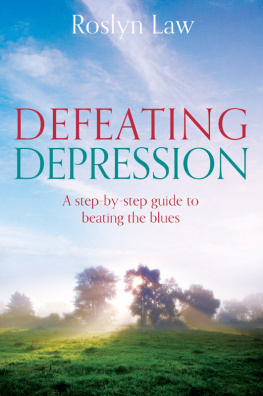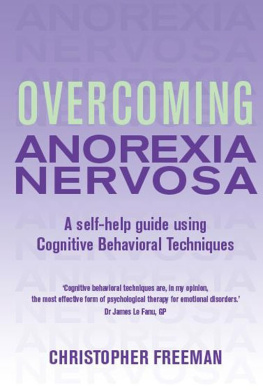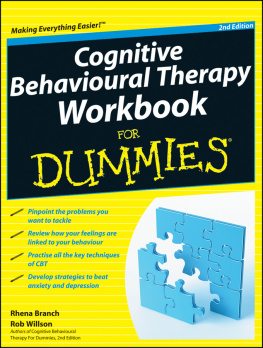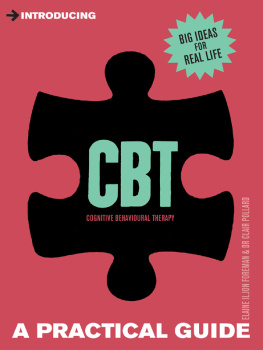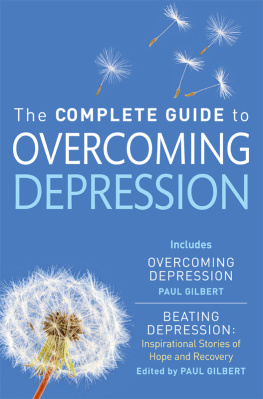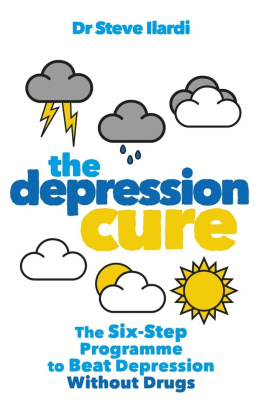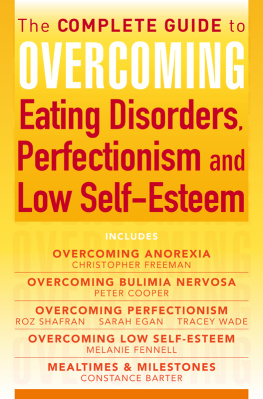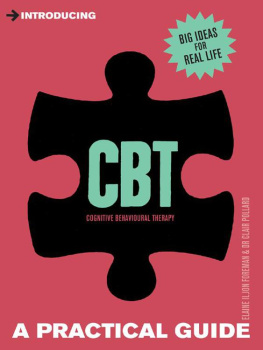Roslyn Law is a Consultant Clinical Psychologist. She studied Psychology at the University of Glasgow and Clinical Psychology at the University of Edinburgh, where she won the Gillian Birrell Prize. She trained to be an IPT therapist and supervisor at the Clarke Institute, University of Toronto. She is Assistant Director of Psychology & Psychotherapies at SWL & St Georges Mental Health NHS Trust and an Honorary Senior Lecturer at University College London. She is Director of the Interpersonal Psychotherapy Practitioner and Supervisor courses at the Anna Freud Centre and Reading University, and the National Lead for IPT in the Improving Access to Psychological Therapies programme.
Defeating Depression
Roslyn Law

Constable & Robinson Ltd
5556 Russell Square
London WC1B 4HP
www.constablerobinson.com
First published in the UK by Robinson,
an imprint of Constable & Robinson Ltd., 2013
Copyright Roslyn Law, 2013
The right of Roslyn Law to be identified as the author of this work has been asserted by her in accordance with the Copyright, Designs and Patents Act 1988
All rights reserved. This book is sold subject to the condition that it shall not, by way of trade or otherwise, be lent, re-sold, hired out or otherwise circulated in any form of binding or cover other than that in which it is published and without a similar condition including this condition being imposed on the subsequent purchaser.
A copy of the British Library Cataloguing in
Publication data is available from the British Library
Important Note
This book is not intended as a substitute for medical advice or treatment. Any person with a condition requiring medical attention should consult a qualified medical practitioner or suitable therapist.
Although we have tried to trace and contact copyright holders before publication, this has not been possible in all cases. If notified, the publisher will be pleased to correct any errors or omissions at the earliest opportunity.
ISBN 978-1-84901-712-1 (paperback)
ISBN 978-1-78033-080-8 (ebook)
Printed and bound in the UK
1 3 5 7 9 10 8 6 4 2
Cover design: Bob Eames
To Mum and Dad,
with love and thanks for their story.
Contents
Acknowledgements
I continue to owe thanks to the people who taught me about IPT in the first place, Edward McAnanama and Laurie Gillies, and to Ellen Frank for her unstinting support and warmth. Thanks are also due to Anthony Bateman and Alessandra Lemma for their generosity and encouragement during my time in London. I am very grateful to the friends and colleagues who generously gave their time in reading and commenting on earlier drafts of this book and listened to many, many versions of the story: Mark Matheson, Liz Robinson, Helen Birchall, Gwynn Binyon and Kate Halliday. Andrew Flynn helped enormously during our many discussions on the role of narrative and has been invaluable in helping me to develop my thoughts in this area. Many others have directly and indirectly contributed to this book by inspiring me and demonstrating its core principles in their friendship, and in particular I would like to thank Adrienne, Jo, M, Gilly and PD, who continually reminds me just what language can do. This book would not have come about were it not for Fritha Saunders and Constable & Robinson Publishers inviting me to write it, and I am grateful for the opportunity and challenge. I would also like to offer very grateful thanks to Gillian Somerscales, who was the embodiment of a good communicator in her encouraging, insightful and very helpful copy-editing. And most especially I am very grateful to all the people with whom I have worked and who have had the courage to share their stories. I am deeply and fortunately indebted.
How to use this book
One of the ironies of writing a self-help book on Interpersonal Psychotherapy (IPT) is that IPT, at its core, is well, interpersonal: that is, its about you and other people. That means its not a private therapy, an approach to treating depression you can use on your own, because it is all about the interactions between people. The work of IPT happens in the space between people how we relate to, communicate with and understand each other. And so there is a proviso in trying to use IPT as a self-help approach: in order for it to work, you have to involve other people. Approaching this treatment as a solo venture runs at odds with the social ideas about depression that we will use in this book ideas that will be helpful when you are working towards recovery. The instinct to go it alone, however, tells us a lot about how easy it is to become isolated in depression, and why that makes it so difficult to ask for the help we need in order to recover.
I am going to suggest therefore that you are better placed to use IPT as a self-help approach if you think about how you and the team you will recruit are going to use this book. You might know your team already. They are the people you already talk to and spend time with partners, friends, family, maybe your IPT therapist. The size of your team will be up to you, and you might involve people for different reasons. There might be a relatively small number of people with whom you feel comfortable sharing the detail of what you are doing, and another group you might want to tap into for different kinds of support and company. The people on your team are the people who are interested in your recovery and would like to help you to get there. You might have lost sight of who these people are while you have been depressed; or maybe you have yet to find them, and will need to go on a recruitment drive. Either way, IPT has some useful ideas about how a collective effort can help you to tackle depression.
By now you will probably have reacted in one of two ways. You may be relieved that youre not going to have to take this on alone; or you may be thinking perhaps this isnt the right approach for you, because you want to protect yourself and hide away from everyone else. Whichever reaction is uppermost for you, stick with me for a little longer, and we will consider how reducing depression and improving the quality of your relationships can be achieved from many different starting points. This book will show you many routes out of depression. It wont dictate the route you must take, but it will serve as a guide along the way, and will encourage and help you to consider who your most useful companions might be and when they should be invited along.
Chapter 1
Introduction:
what can IPT do for you?
The greatest challenge to any thinker is stating the problem in a way that will allow a solution.
BERTRAND RUSSELL, PHILOSOPHER
Interpersonal Therapy IPT focuses on the difficulties in relationships with other people that are often important in depression, recognizing that depression is likely both to spark relationship problems and to be the result of them. IPT isnt burdened by complicated explanations about why these problems happen. Instead, it looks at the day-to-day difficulties you may be experiencing in keeping relationships going or in sorting out the inevitable problems with other people that develop when you are depressed, and helps you to disentangle the two strands.
IPT is a well-researched and well-practised approach that has been used effectively for over forty years in lifting people out of depression and helping them to stay well for longer. It has helped people of all ages from teenagers to women and men well into their retirement. IPT has also helped people with eating disorders, bipolar disorder (a mix of very high and low moods) and some anxiety problems. This book will focus .
Next page
